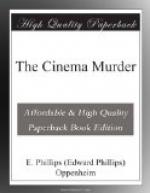“I picked up the pocketbook which I had shaken out of his clothes in that first struggle. I studied its contents, and it gave me an idea. I went to Liverpool, stayed at the hotel where he had engaged rooms, dressed myself in his clothes, and went on the steamer in his place. I travelled to New York as Mr. Douglas Romilly of the Douglas Romilly Shoe Company, occupied my room at the Waldorf under that name. Then I disappeared suddenly—there were too many people waiting to see me. I took the pseudonym which he had carefully prepared for himself and hid for a time in a small tenement house. Then I rewrote the play. There you have my story.”
“You—murdered him, Philip!... You!”
“It was no crime,” he continued calmly, filled with a queer sense of relief at the idea of being able to talk about it. “My whole life, up till that day, had been one epitome of injustice and evil fortune. You were my one solace. His life—well, you know what it had been. Everything was made easy for him. He had a luxurious boyhood, he was sent to college, pampered and spoilt, and passed on to a dissipated manhood. He spent a great fortune, ruined a magnificent business. He lived, month by month, hour by hour, for just the voluptuous pleasures which his wealth made possible to him. That was the man I met on the canal bank that afternoon. You know the state I was in. You know very well the grievance I had against him.”
“You had no right to interfere,” she said dully. “If I chose to accept what he had to give, it was my business. There never had been over-much affection between you and me. We were just waifs together. Life wouldn’t give us what we wanted. I had made up my mind months before to escape whenever the opportunity came. Douglas brought it to me and I snatched at it. I am not accepting any blame.”
He leaned towards her.
“Neither am I,” he declared. “Do you remember we used to talk about the doctrine of responsibility? I am a pervert. I did what I had to do, and I am content.”
She stood quite still for several moments. Then she took out the pins from her hat, banged it upon the table, opened her tweed coat, came round to the fireside, and threw herself into an easy-chair. Her action was portentous and significant.
“Tell me how you found me out?” he asked, after a brief pause.
“I was dismissed from Detton Magna,” she told him. “I had to go and be waiting-maid to Aunt Esther at Croydon. I took the place of her maid-of-all-work. I scrubbed for my living. There wasn’t anything else. I hadn’t clothes to try for the bolder things, not a friend in the world, but I was only waiting. I meant, at the first chance, to rob Aunt Esther, to come to London, dress myself properly, and find a post on the stage, if possible. I wasn’t particular. Then one day a man came to see me—an American. He’d travelled all the way from New York because he was interested in what he called the mysterious Romilly disappearance. He knew that I had been Douglas’ friend. He asked me to come out and identify—you! He offered me my passage, a hundred pounds, and to give me a start in life here, if I needed it. So I came out with him.”




